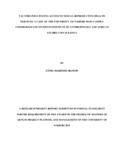| dc.description.abstract | The purpose of this study was to assess factors influencing accessibility to Reproductive Health
services by the undergraduate student of the University of Nairobi Main Campus, IAGAS unit.
Previous studies highlight numerous issues caused by inaccessibility and underutilization of
Sexual Reproductive Health (SRH) services such as: high levels of teenage pregnancies who are
at risk of HIV infection, unsafe abortions, Sexually Transmitted Diseases (STI)s, unintended
pregnancies and premature sex. This study was guided by the following objectives: to find out
how health system factors influence access to Sexual Reproductive Health, to institute how
knowledge factors influence access to Sexual Reproductive Health Services, to establish how
social factors influence access to Sexual Reproductive Health Services and to establish how
economic factors influence access to Sexual Reproductive Health Services by the undergraduate
university students. Descriptive survey design research methods was used in this research. It was
used to collect data in order to answer questions touching on current status of SRH access
amongst undergraduate students. A sample of 198 respondents was selected using simple random
sampling technique. Research instruments included use of structured questionnaires. The data
collected was analyzed using statistical package for social sciences (SPSS) and Excel spread
sheet. The data output is presented in form of tables and description. The research findings show
that several factors as health facility, knowledge, social and economic factors have been found to
be interacting with the access of sexual reproductive health services by undergraduate students.
On the extent to which health system factors affect access to sexual reproductive health services,
the study found out that most of the students were undecided to state if there is adequate
information from IEC materials at the health facility, there is lack of distinctive and functional
department to provide youth friendly SRH services and some were not able to access the health
facilities. The study also found that there was inadequate information from the health provider
and ineffective youth friendly services. Regression analysis showed that the interaction between
health system factors and access to sexual reproductive health services was negative with β= 0.257
at significant level 0.326. Knowledge factors were found to affect access of SRH services.
Knowledge factors positively affect access to sexual reproductive health services with β = 0.826
at significant level 0.045. While, social factors influence access of sexual reproductive health
service which is positively related to access to sexual reproductive health services with β =0.498
at significant level 0.069. Some of the suggested platforms through which information on SRH
services should be conveyed, included through internet/social media, TV and radio in that order
of preference hence internet and social media was highly preferred. On the other end, economic
factors influence access of sexual reproductive health services negatively with β = -0.038 at
significant level 0.905. Based on the findings, the study recommended that; the government
through learning institution should put in place an effective legal infrastructure and policies to
remove barriers to the access to health care in learning institutions. Institutions should identify
young people’s reproductive health needs as a priority and equip the health care and education
system to address the youth’s specific sexual reproductive health needs. The study concludes that
access to sexual reproductive health services is influenced by health system factors which have a
negative influence, knowledge factors which have a positive influence, social factors which have
a positive influence and economic factors which have a negative influence. | en_US |

